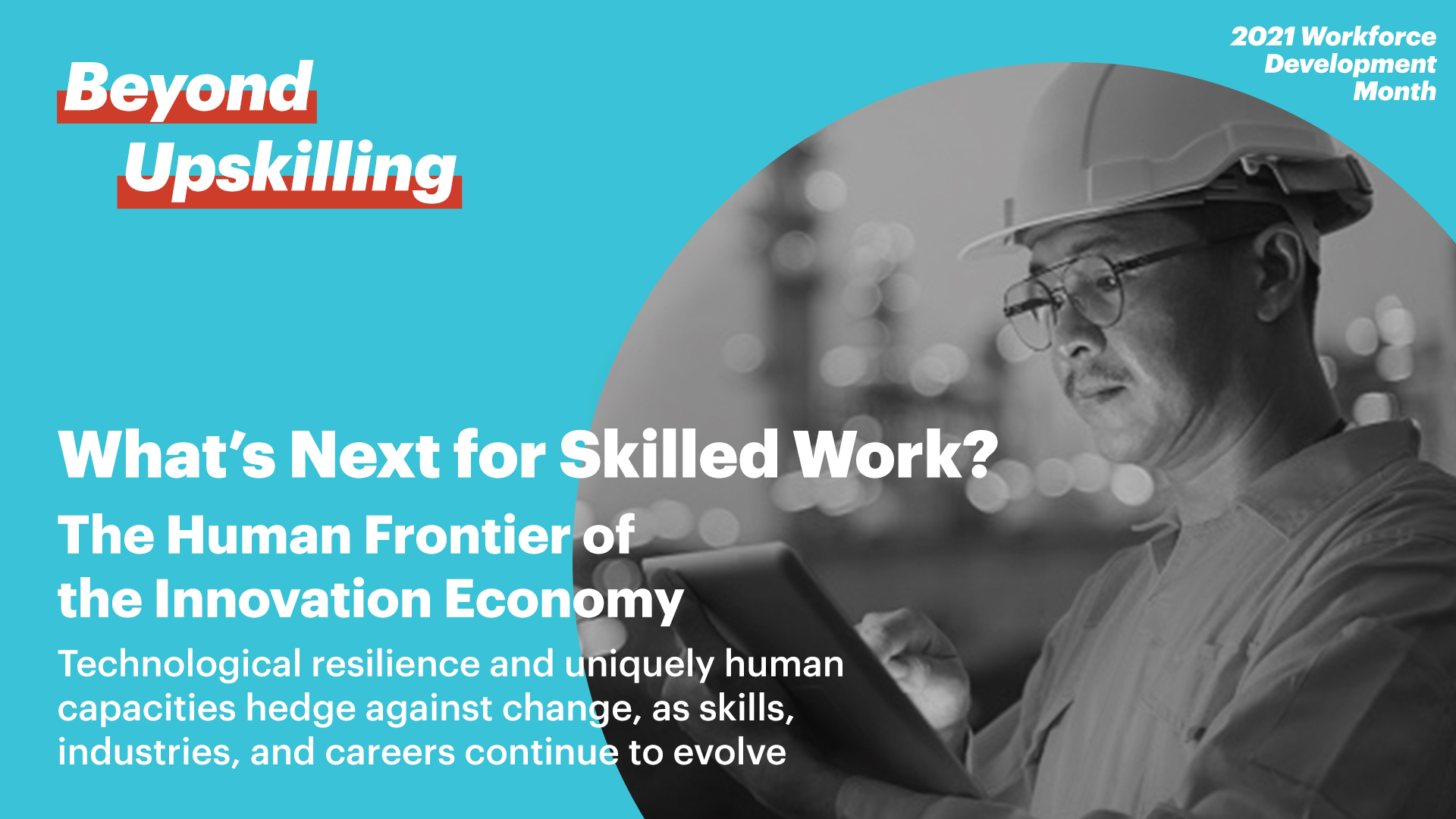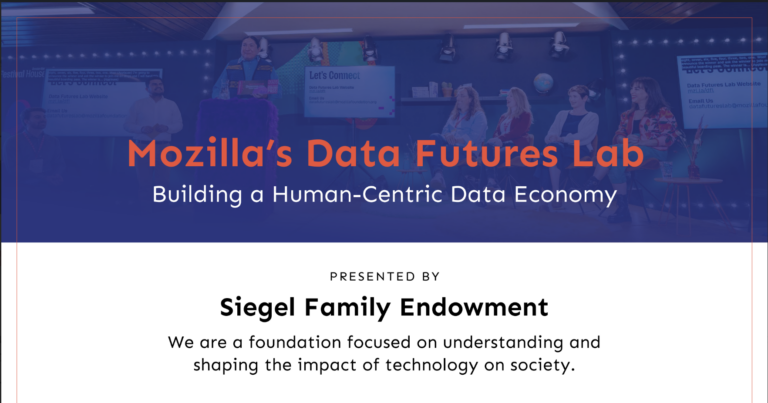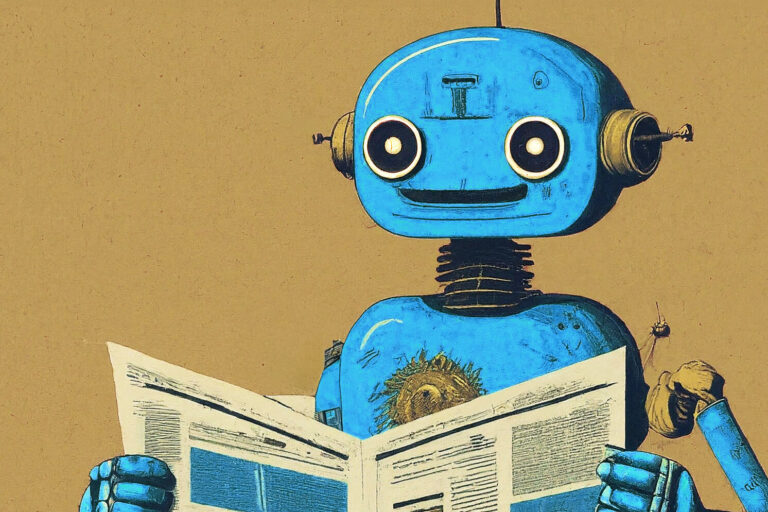
As the innovation economy continues to evolve and exert new demands on people’s time, skills, and education, creating a more adaptable and inclusive workforce is becoming increasingly urgent. Siegel Family Endowment’s grantees have significantly advanced the conversation around career adaptability, transferable skills, job quality, meaningful credentials, and employment. Over the course of the last month, SFE’s “Beyond Upskilling” series has explored the opportunities that employers have to contribute to a more inclusive innovation economy, the factors that individuals need to be aware of as they develop new skillsets for emerging career tracks and job types, and the work that SFE’s grantees are doing to help more and more people continue to navigate these rapidly changing frontiers. In this final installment in the series, we’ll explore some of the new frontiers that will help people work alongside new technologies more easily, responsibly, and resiliently in the future.
A lot of predictions have been made in the last few years about new technology automating entire fields and careers out of existence. While automation does pose a threat to the status quo, we believe it has had a greater impact on the quality of jobs and the types of work that are most readily available. Many of the changes brought about by these technological advancements even stand to improve the prospects and prosperity of more people, and could improve access to better career opportunities. One thing is for certain, though – we still don’t know the full extent of how the impact of these changes will be felt across the innovation economy, or who may be affected by future shifts.
As we prepare and continue to work alongside new technology, we can make plans and systems-level accommodations for new kinds of work. Research from the SFE-funded MIT Work of the Future Task Force Report found that technological change is replacing older types of work, while simultaneously creating new work: about 63 percent of the jobs performed in 2018 did not exist in 1940. Grappling with the scope and range of changing types of work can feel overwhelming, but it’s imperative that we explore technology’s potential. In order to unlock new types of career paths, opportunities, and modalities for working that would have previously been impossible to conceive, we need to do more than simply respond to changes driven by the adoption of new technology: we need to rely more than ever before on the factors that make us uniquely human.
New types of work will continue to rely on emerging technologies, and future-resilient skills will only become increasingly important in the face of ongoing change. To that end, SFE is supporting programs that recognize the importance of “uniquely human skills” – the social, creative, and intangible skills that cannot be automated away – and organizations who maintain an open mind around when and how those skills are acquired.
As we make grants to a wide range of organizations that focus on enhancing entrepreneurial ecosystems, we’re simultaneously expanding our focus to support work at the human frontier of the innovation economy. These partnerships are designed to help us consider new possibilities for what the future of work looks like, and how skills, industries, and careers will continue to evolve. Keeping on top of these new and emerging developments will help us make better informed, more agile decisions about navigating the persistently changing innovation economy.
Unpacking the Changing Nature of Work
As mentioned above, MIT’s Work of the Future initiative aims to “understand how emerging technologies are changing the nature of human work and the skills required—and how we can design and leverage technological innovations for the benefit of everyone in society.” After a multiyear research effort that produced a range of different research, reports, and perspectives on the ways that new technology is impacting humans and the labor market, the team that’s been leading this effort has now shifted their focus to disseminating their findings and sharing outcomes. This unique academic effort brings together voices from a range of disciplines, and has already produced field-leading recommendations about how technology and innovation are impacting, and will continue to impact, work (and workers) everywhere.
New Paradigms for Technology in the Workplace
SFE recently made research grants to the University of North Carolina at Chapel Hill and Portland State University Foundation to study how Manufacturing Extension Partnership Programs (MEPs) can help mitigate automation-related job loss. In recognition of the fact that more manufacturing careers require skills and technological fluencies that are changing rapidly, these two partnerships are focused on providing a road map for more inclusive and complementary relationships between human capital and labor. By moving beyond traditional workforce training, MEPs have the potential to promote high-quality jobs, career mobility, and racial equity standards.
That’s a Wrap on Workforce Development Month
The future holds a lot of potential, and it’s incumbent on us to figure out how we can best harness it to match our own uniquely human potential. As we look beyond upskilling in our research and thinking about the future of work, we’re focusing our attention on the solutions that feel best positioned to create a future that works for all people, and that provides ample opportunities to thrive, grow, and succeed in a wide range of different careers. We’re hopeful that the work and grantees that we’ve highlighted over the last month have expanded your understanding of what the future might look like, and to think more about how we can collaborate to get there together.





